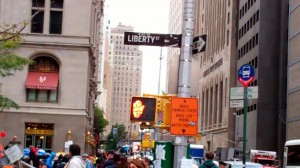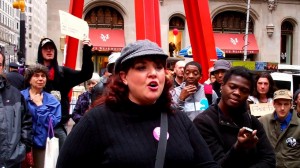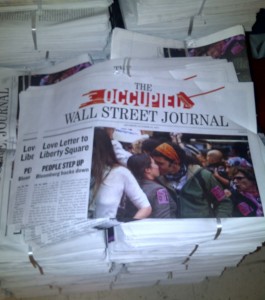Shannon Biggs directs the Community Rights program at Global Exchange.
On October 26 I spent a chilly and drizzly day on Wall Street along with my fellow community-rights organizer, Ben Price from CELDF. We had been asked to share our experiences with those occupying Liberty Plaza. Together we spoke on the steps in the now-famous style of ‘the People’s Mic’, an altogether exhilarating experience. Below is a portion of my talk.
Greetings from Global Exchange, Occupy Wall Street West, San Francisco and Oakland California, and the land of the Ohlone tribe. I am deeply honored to be here at the US epicenter of the most important thing happening in the world right now — a budding revolution for real democracy.
We the 99% are naturally diverse.
We’re young, we’re old, we cross the political spectrum, we’re urban, we’re rural, we’re the overworked, the underpaid and the unemployed. What unifies us is not just our outrage against the handful of global rule-makers who occupy OUR streets, but a common goal to change the rules.
We the 99% seek more than the illusion of democracy.
We want government in the hands of the people. We want more than the opportunity to elect the next politician to carry out the corporate agenda.
As I boarded the plane yesterday before dawn, hundreds of police forces swarmed our comrades Occupying Oakland, CA. Tear gas, rubber bullets, flash bang grenades and excessive force resulted in dozens of injuries and arrests throughout the day and into the night. I hold them in my heart as I stand here with you all today and ask you to do the same.
Other cities are also being forcibly swept, and as the cold of winter approaches, pundits question the resolve of those holding open this public space. Politicians who initially disregarded us, now desperately seek to curry our favor in an election year, hoping to move our cause from structural change to a few policy concessions to business as usual.
Some say we’re leaderless. But our truth is we’re all leaders.
The power of this moment lies in our refusal to be divided by partisan politics and to stay focused on dismantling corporate rule by taking control of our own structures of government. Rule by the people. If we can remain united in this, it is we — the 99% — that are too big to fail.
Occupiers, you have shifted the conversation – a feat that can’t be overstated. You have woken up millions of the disillusioned, and inspired them to find their own voice, their own power. We have the opportunity now to shift more than just politicians but the political and economic paradigm that places corporate interests above our shared values of justice, equality, good jobs, healthy resilient vibrant communities and ecosystems. This is our time.
Our communities are ground zero for the corporate-friendly policies of current law. Everything from the destructive Tar Sands pipeline, to GMOs and pesticides on the supermarket shelves, to big box stores, to unemployment, occurs in a real place on the map, and is experienced by real people living in a community. We are all being denied the right to determine our own quality of life and have become sacrifice zones to corporate plans of one kind or another. But that is changing.
My colleague, Ben Price of the Community Environmental Legal Defense Fund, and I are here today to share our experiences from the front lines of the movement for community and nature’s rights. Over 125 communities (and growing) are taking control of their local government and stripping corporations of their constitutional protections. More than 600,000 people are living under these rights-based laws (and growing) in order to ban unwanted corporate activity in their midst, or to legalize and practice sustainability.
These communities have begun to understand that the specific issues that affect them cannot be solved without dismantling a structure of law, government, and culture that guarantees that corporate minorities will continue to make decisions on energy, agriculture, and environmental extraction.
This movement for community and nature’s rights isn’t about electing the “right” people – it is about exercising our fundamental right to local self-governing authority. As rights-based community organizers we assist citizens to pass local laws that assert their right to decide what happens in their community on issues of local concern, recognize rights of nature, and strip corporate so-called “rights.”
We stand on the shoulders of past peoples movements.
These movements sought to force cultural transformation, social transformation, political and economic transformation. These were movements for RIGHTS.
Abolitionists did not seek to regulate slave owners to be kinder to slaves. They fought for equality and to drive the rights of African Americans into law. Suffragettes did not wait for permission, they asserted their rights and broke the law to cast their ballots, as was their right. And while the lunch counter sit-ins are historically remembered in Greensboro, people in over 700 cities asserted their rights in this way, in some places for over two years. These are the defining moments of movements for rights that change unjust laws.
Rights come from creation. By virtue of being born we are all equal, Rights cannot be granted to corporations because corporations are in fact property, a legal fiction on paper, a mechanism for conducting business. Property cannot hold rights.
JUST laws are instituted to protect and uphold rights. When the law denies rights of people and nature, we can and must change the laws – they are OUR laws.
This is a defining moment.
If we truly seek change, we must become the new civil rights movement of our time. Together we can occupy Wall Street, occupy Main Street, occupy City Hall and our local governments — not just today, but everyday.
Thank you, OWS.
We were asked to give our entire 1 hour presentations again indoors for the OWS web network. It is available here in its entirety. (Its worth saying that the speeches, prepared for the format of the People’s Mic, did not feel the same during taping, and after a few minutes quickly abandoned written text for more conversational discussion.)



